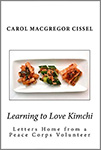Review — LEARNING TO LOVE KIMCHI by Carol MacGregor Cissel (Korea)
 Learning to Love Kimchi: Letters Home from a Peace Corps Volunteer
Learning to Love Kimchi: Letters Home from a Peace Corps Volunteer
Carol MacGregor Cissel (Korea 1973–75)
CreateSpace
May 2016
274 pages
$10.99 (paperback), $4.99 (Kindle)
Reviewed by Clifford Garstang (Korea 1976–77)
•
CAROL CISSEL EMBARKED on her Peace Corps odyssey in December, 1973. “We’re in Korea!” she writes home to her mother upon arrival after a journey through Honolulu and Tokyo with her service group. This exclamation forms the opening of Cissel’s memoir, Learning to Love Kimchi. What follows are all the letters she wrote to her mother over the course of her two years working in Korea as an education Volunteer and the months spent touring Southeast Asia after the completion of her service. My own Peace Corps/Korea experience began just a few days after Cissel left the country, so I read these letters with considerable fondness and nostalgia, remembering my own first taste of kimchi, my own first exposure to the squat toilets and bathhouses, my own struggles with the language, my own loneliness after leaving the camaraderie of our training site, and my own frustrations with my job.
I confess that I was skeptical about a memoir told entirely through letters, however. The letters I wrote to my parents from Korea — lost forever, sadly, and not nearly as numerous as Cissel’s — were filled with the quotidian: my daily routine, my gripes, and mundane details that only a mother could love. Cissel’s letters are the same (and perhaps more so). These details succeed in creating a sense of hyper-reality, in the documentary sense. But like a novel, a satisfying memoir also needs a narrative arc, something to pull the reader forward, keeping those pages turning. It shouldn’t be just a chronology, a sequence of events over time.
Although faint, that crucial arc is present here, as it turns out, with enough narrative tension that I wanted to keep reading. The letters — Cissel wrote every week, sometimes twice — raise numerous questions that the reader wants answered: When will she meet Dave, the Volunteer she will marry, as we know from the Preface? When will their relationship deepen beyond friendship? Will she get the transfer she requests, as she tells her mother in several letters, or will she terminate her service early? Keep reading to find out what happens!
The world has changed since the 1970s, and so has Peace Corps service. For one thing, Volunteers now have Internet, email, and cellphones, so that handwritten letters home are probably a rarity these days. But most of us who were Volunteers back then will recognize Cissel’s environment and the challenges she faced. Her living situation wasn’t as primitive as it could have been — on her post-termination trip to the Philippines she meets Volunteers there who had it rougher — but it was very basic, and very similar to my own. Like many Volunteers, she found her work assignment less fulfilling than she’d hoped. And like many Volunteers, myself included, during her first year of service she agonized endlessly over whether to quit and go home early, only to reassure her loved ones that she wasn’t as miserable as she sounded. RPCVs will find plenty here to relate to.
So the book is a good read, but any author at some point has to face the question of who her audience might be. My guess is that other Volunteers who served in Korea will find it of interest, as I did. (I’ve read two other excellent memoirs about service in Korea: Land of Morning Calm—My Journey in Korea by Laren Metzer, who was in my service group; and The Time of the Monkey, Rooster and Dog—A Peace Corps Volunteer’s Years in Korea by Chuck Hobbie.) RPCVs from other countries might enjoy comparing their own experiences to Cissel’s. It might also be interesting to people interested in that period of economic development in Korea, simply because the country has changed so much in the ensuing decades. And it occurs to me that I’ll want to share it with my own family so that they might get a clearer picture of what I went through as a young man so many years ago.
The sheer detail of the book, which at first seemed a weakness, provides a richness that a more superficial telling would miss, richness that makes the memoir all the more vibrant.
•
Reviewer Clifford Garstang is the author of What the Zhang Boys Know (Press 53), a novel in stories that won the 2013 Library of Virginia Literary Award for Fiction, and In an Uncharted Country (Press 53), a story collection that won Peace Corps Writers’ Maria Thomas Fiction Award in 2010. He is also the editor of Everywhere Stories: Short Fiction from a Small Planet, a short story collection that includes several RPCV writers. Volume II of the series will be published in October 2016.
No comments yet.
Add your comment